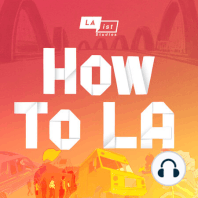16 min listen
Revival House: The Long Road From Silent Films to Brain Dead Studios
FromHow To LA
ratings:
Length:
17 minutes
Released:
Apr 10, 2024
Format:
Podcast episode
Description
#264:
Go back to the movies with us!
We're still profiling LA's repertory theaters in Revival House cause there are SO MANY to check out! In this episode, we explore a cool space with some deep, messy history.
Fashion label Brain Dead has taken over a site that some would consider....a little cursed. Originally opened in the 1940s as The Silent Movie Theater on Fairfax, the venue was home to premieres and parties. Until a theft and murder shut the theater down.
In the 2000s, it was taken over by Cinefamily, which programmed in that space until allegations of abuse came to light in 2017.
But today, Brain Dead Studios is keeping the lights on for nerds, artists, and skate punks in Los Angeles -- aiming to create an eclectic community space to inspire creatives and show good movies. Take a listen as we explain the history and present of this theater.
Guests: Professor and historian Ross Melnick, Brain Dead founder Kyle Ng
Go back to the movies with us!
We're still profiling LA's repertory theaters in Revival House cause there are SO MANY to check out! In this episode, we explore a cool space with some deep, messy history.
Fashion label Brain Dead has taken over a site that some would consider....a little cursed. Originally opened in the 1940s as The Silent Movie Theater on Fairfax, the venue was home to premieres and parties. Until a theft and murder shut the theater down.
In the 2000s, it was taken over by Cinefamily, which programmed in that space until allegations of abuse came to light in 2017.
But today, Brain Dead Studios is keeping the lights on for nerds, artists, and skate punks in Los Angeles -- aiming to create an eclectic community space to inspire creatives and show good movies. Take a listen as we explain the history and present of this theater.
Guests: Professor and historian Ross Melnick, Brain Dead founder Kyle Ng
Released:
Apr 10, 2024
Format:
Podcast episode
Titles in the series (100)
City Controller Kenneth Mejia Wants To Be Transparent by How To LA
